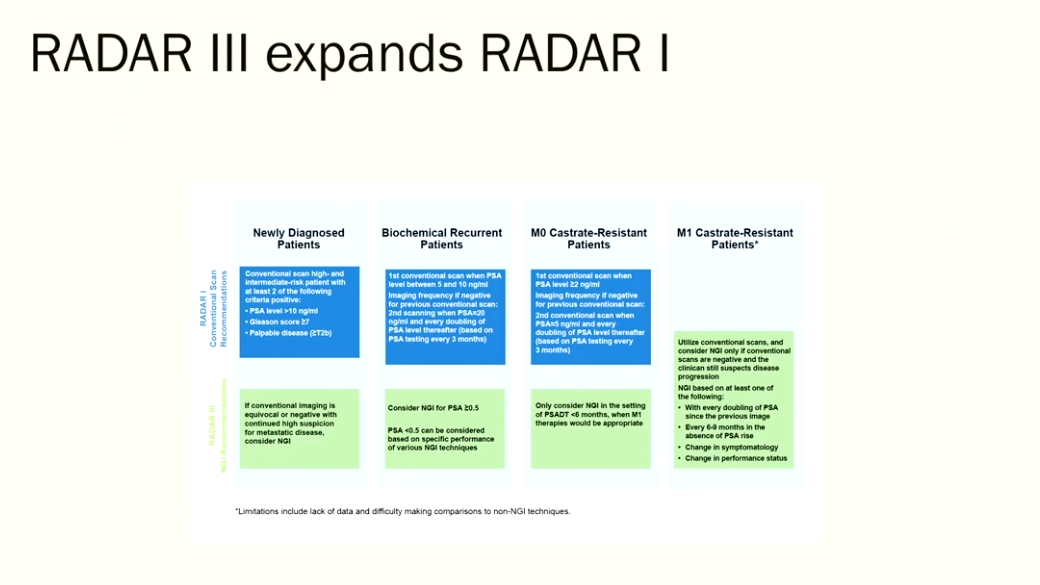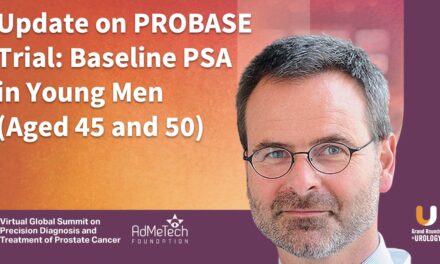E. David Crawford, MD, and Phillip J. Koo, MD, presented “Summarizing the RADAR Guidelines” during the 27th Annual Perspectives in Urology: Point Counterpoint on November 9, 2018 in Scottsdale, Arizona.
How to cite: Crawford, E. David and Koo, Phillip J. “Summarizing the RADAR Guidelines” November 9, 2018. Accessed Nov 2025. https://grandroundsinurology.com/summarizing-the-radar-guidelines/
Summarizing the RADAR Guidelines:
E. David Crawford, MD, reviews the findings and recommendations of the Radiographic Assessments for Detection of Advanced Recurrence (RADAR) I and II working groups. Phillip J. Koo, MD, then discusses the rationale for RADAR III and the expansion in recommendations from the first two iterations, focusing on updates regarding next generation imaging.
Abstract:
RADAR I, published in 2014, addressed a lack of consensus among imaging guidelines for metastatic disease in prostate cancer. As a result of these inconsistencies, there was significant underdiagnosis of metastatic disease. The group of experts reviewed the guidelines available at the time and presented their own recommendations defining optimal strategies for early identification of metastases in patients with prostate cancer.
The RADAR II group coined the term “therapeutic layering” in their review, published in 2017. Their goal was to provide consensus and guidance on the sequencing and combination of approved treatments for metastatic castration resistant prostate cancer (CRPC).
Building from the first two iterations of the RADAR working group, RADAR III aimed to understand the potential use of next generation imaging (NGI) modalities in the initial staging of prostate cancer, as well as in biochemically recurrent, nonmetastatic or metastatic prostate cancer, and CRPC patients. This presentation summarizes the expansions from RADAR I and II recommendations included in RADAR III.
Additional objectives of RADAR III involved the integration of results obtained into clinical decision-making algorithms, gauging the rapidity and ease of uptake of these modalities in different clinical practice settings across the country, as well as redefining existing terminology to better represent the changing landscape in these disease settings.
RADAR III discussed major radiopharmaceuticals such as fluciclovine, C-11 choline, and gallium 68 PSMA. The most mature and robust data evaluating these NGI tools has been in biochemical recurrent patients. Overall, the data favors these NGI agents as compared to conventional imaging methods. Therefore, the group’s strongest recommendation for use of NGI is in patients with biochemical recurrent prostate cancer.
About Perspectives in Urology: Point Counterpoint
Perspectives in Urology: Point Counterpoint (PCP) is an annual CME-accredited conference devoted to discussing and debating the latest topics in men’s health, general urology, and genitourinary cancers. The conference’s format includes more than didactic lectures. It also includes debates, point-counterpoint discussion panels, and unique case-based presentations. Drs. Crawford and Koo presented this lecture during the 27th PCP in 2018. Please visit this page in order to register for future PCP meetings.
ABOUT THE AUTHOR
Phillip J. Koo, MD, is the Chief of Diagnostic Imaging at the Banner MD Anderson Cancer Center in Phoenix, Arizona. Prior to this, he was Chief of Nuclear Medicine and Associate Professor of Radiology at the University of Colorado School of Medicine in Aurora, Colorado. He completed his fellowship at the Harvard Medical School Joint Program in Nuclear Medicine in Boston, Massachusetts. Dr. Koo is a diplomate of both the American Board of Radiology (ABR) and American Board of Nuclear Medicine(ABNM).






